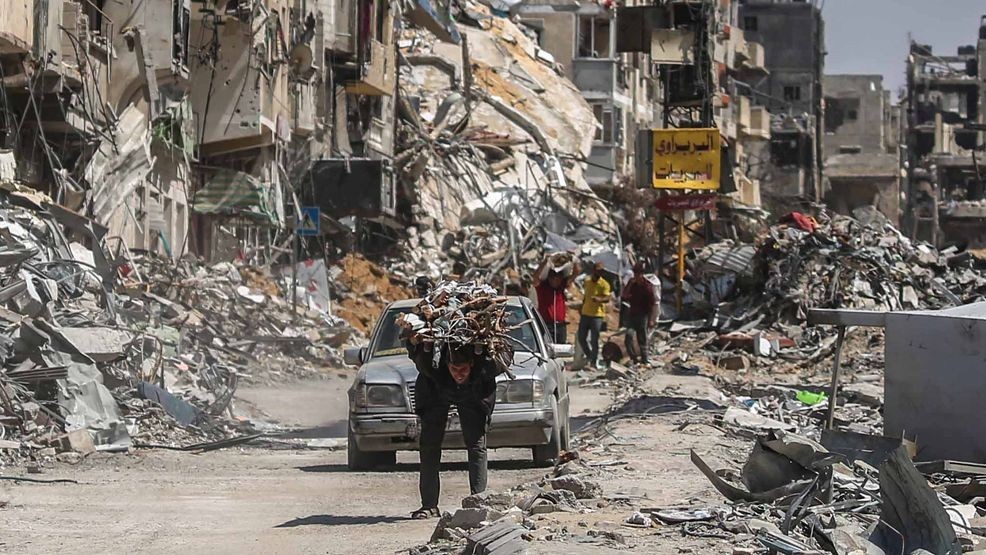Listen to the article
In a significant development following the recent ceasefire agreement, the Palestinian Authority has unveiled an ambitious $67 billion plan to rebuild the Gaza Strip over the next five years. The comprehensive reconstruction strategy comes as the region grapples with unprecedented levels of destruction following months of intense conflict.
Palestinian Prime Minister Mohammed Mustafa presented the multi-phase approach that prioritizes immediate humanitarian relief before transitioning to long-term reconstruction. The initial six-month phase, budgeted at $3.5 billion, will address critical infrastructure and urgent humanitarian needs in a territory where basic services have been largely destroyed.
This will be followed by a more substantial three-year second phase requiring approximately $30 billion. The final phase will complete the reconstruction process, restoring Gaza’s severely damaged urban landscape and public infrastructure.
The scale of destruction in Gaza has been meticulously documented by the United Nations. A recent UN assessment places the total infrastructure damage at approximately $70 billion, aligning closely with the Palestinian Authority’s own estimates. According to the UN Satellite Center, more than 80% of Gaza’s structures have sustained damage, with approximately 81,000 housing units affected.
Beyond buildings, critical utilities including electricity networks and water systems require complete restoration. The BBC’s fact-checking unit reports that clearing operations will need to remove an estimated 60 million tons of debris before substantial rebuilding can begin.
The devastation has drawn comparisons to post-World War II reconstruction efforts. Following that global conflict, the United Kingdom rebuilt approximately one million new homes to address wartime destruction. In Germany, where about 25% of housing was rendered uninhabitable, the economic infrastructure had collapsed entirely.
The United States played a crucial role in European recovery through the Marshall Plan, with Congress allocating approximately $13 billion (equivalent to over $150 billion in today’s currency) to rebuild war-torn nations. Similarly, American forces implemented reforms and invested roughly $2 billion in Japan, helping transform it into the economic powerhouse it remains today.
Gaza’s reconstruction presents unique challenges beyond just the financial requirements. The territory’s isolation, limited access to building materials, and complex political dynamics create obstacles that weren’t present in post-WWII Europe. Additionally, the recurring cycle of conflict and rebuilding has plagued previous reconstruction efforts in the region.
International donors will likely be called upon to fund much of the reconstruction, raising questions about which nations or organizations might step forward with significant contributions. The Palestinian Authority’s announcement comes at a time when global humanitarian funding is stretched thin by multiple concurrent crises.
Economic experts note that successful reconstruction could potentially revitalize Gaza’s economy, creating thousands of jobs in construction and related industries. However, sustainable recovery will require not just rebuilding physical infrastructure but also addressing the underlying economic constraints that have hindered development in the territory for years.
The five-year timeframe proposed by Palestinian officials represents an optimistic schedule given the extent of the damage and the complex logistical challenges involved. Previous reconstruction efforts in conflict zones suggest that rebuilding could take significantly longer, particularly if political instability persists.
As implementation of the ceasefire continues, attention now turns to whether this ambitious reconstruction plan can secure the necessary international backing and overcome the considerable obstacles to restore normal life in one of the world’s most densely populated and heavily damaged regions.
Verify This Yourself
Use these professional tools to fact-check and investigate claims independently
Reverse Image Search
Check if this image has been used elsewhere or in different contexts
Ask Our AI About This Claim
Get instant answers with web-powered AI analysis
Related Fact-Checks
See what other fact-checkers have said about similar claims
Want More Verification Tools?
Access our full suite of professional disinformation monitoring and investigation tools




8 Comments
Securing the necessary funding and coordinating the reconstruction will be key. It’s good to see a phased approach that prioritizes urgent humanitarian relief first. Transitioning to long-term infrastructure restoration will be crucial for Gaza’s recovery.
Agreed. Effective aid distribution and project management will be essential to ensure the funds are used efficiently and transparently.
The humanitarian crisis in Gaza is heartbreaking. I hope this reconstruction plan can begin to address the immense suffering and restore some sense of normalcy for the people there. But it will require sustained global commitment and support.
Rebuilding Gaza will be a monumental challenge, both logistically and financially. A $67 billion plan over 5 years is ambitious, but necessary given the scale of destruction. I hope the international community can come together to support this critical effort.
Rebuilding critical infrastructure like water, power, and housing is the first step, but the long-term vision should also focus on economic development and job creation. Empowering Gazans to rebuild their own communities is key to a successful recovery.
Allocating $3.5 billion for the initial humanitarian relief phase seems prudent. Addressing urgent needs like food, shelter, and medical care should be the top priority before transitioning to more complex reconstruction projects.
With an estimated $70 billion in total infrastructure damage, this reconstruction plan seems realistically aligned with the scale of the challenge. I’m curious to see how the Palestinian Authority plans to mobilize and coordinate such a massive undertaking.
Strong international partnerships and oversight will be vital to make sure the reconstruction process is carried out effectively and equitably.